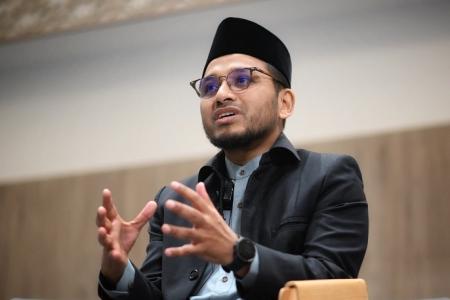New Islamic college to open in S'pore in 2028
Singapore’s upcoming Islamic college will open its doors in 2028, welcoming an initial intake of up to 60 students at the Islamic Religious Council of Singapore’s (Muis) campus in Bencoolen Street.
Graduates of the Singapore College of Islamic Studies (SCIS) will not have to undertake the Postgraduate Certificate in Islam in Contemporary Societies one-year mandatory programme aimed at equipping graduates from institutions abroad with the knowledge and skills to serve in the religious sector here.
Singapore’s Mufti Nazirudin Mohd Nasir, who heads the steering committee overseeing the planning and development of SCIS, said on Nov 11 that the programme had been instrumental in laying the foundation for the future college.
“We have learnt a lot from the programme over the last four years in terms of working with partners, developing a very robust curriculum, and incorporating skills and competencies in an educational programme at the university level,” he added.
Speaking to the media following an engagement session with local asatizah (religious teachers), Dr Nazirudin said SCIS students will receive comprehensive training in religious studies in their foundational years, regardless of whether they choose to specialise in Islamic studies or social sciences.
This will allow them to serve as Tier 1 asatizah – religious teachers who have graduated in Islamic studies from a recognised university and also have a good command of the Arabic language.
Classes will be held at Muis’ five-storey Bencoolen campus, which opened in 2022 and has facilities such as lecture halls, seminar rooms and a library.
While SCIS will accept students from overseas who meet certain criteria, the college’s focus will be on those who have passed through Singapore’s madrasah system, which teaches enrollees at primary, secondary and pre-university levels.
SCIS’ interdisciplinary curriculum is now being developed, while local asatizah will be trained to serve as faculty ahead of the college’s opening, said Dr Nazirudin.
The complexity of such an undertaking requires support from various sectors, including that of Singapore’s Muslim community, he added.
Prime Minister Lawrence Wong announced on Nov 10 that SCIS will offer a full-time undergraduate degree programme allowing students to major in either Islamic studies or social sciences.
PM Wong said then that SCIS will partner with the Singapore University of Social Sciences for its social sciences pathway, and with Egypt’s Islamic advisory body Dar al-Ifta, Morocco’s Al-Qarawiyyin University and the University of Jordan for its Islamic studies pathway.
The college was mooted in 2016 by then Minister-in-charge of Muslim Affairs Yaacob Ibrahim, with the aim of producing religious leaders grounded in Singapore’s multiracial and multi-religious context.
Similar institutes of higher learning in other non-Muslim majority countries include Zaytuna College in the US and the Cambridge Muslim College in Britain, both established in 2009.
Dr Nazirudin acknowledged that foreign institutions, some of which have more than a thousand years of history in teaching religious studies, have their appeal to aspiring asatizah.
However, he believes Singapore’s new college has a unique value proposition through its partnerships.
Such collaborations allow students to draw on the expertise of multiple institutions – such as Dar al-Ifta’s experience in Islamic jurisprudence and fatwa (religious rulings) and the University of Jordan’s specialisation in Islam and contemporary issues – within a programme that aims to better serve the local context.
“I think that will be something that our students will look forward to and really appreciate,” the mufti said.
An average of about 120 madrasah graduates pursue further Islamic studies overseas each year.
Dr Nazirudin added that the college will also look at incorporating various technologies such as artificial intelligence, both in terms of employing them in lessons and training students on the competencies needed to use such technologies for teaching and reaching out to different segments of society.
Get The New Paper on your phone with the free TNP app. Download from the Apple App Store or Google Play Store now


